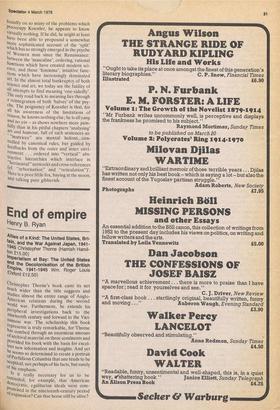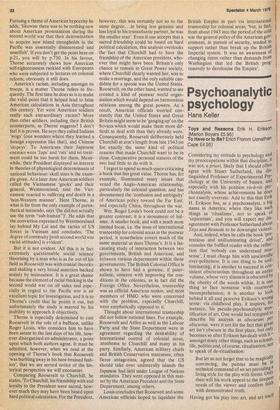End of empire
Henry B. Ryan
Allies of a Kind: The United States, Britain, and the War Against Japan, 194145 Christopher Thorne (Hamish Hamilton £15.00) IMPerialism at Bay: The United States ?..rld the Decolonisation of the British tnripire, 1941-1945 Wm. Roger Louis (Oxford £12.50) Christopher Thorne's book casts its net Much wider than the title suggests and Studies almost the entire range of AngloAmerican relations during the second World war. Furthermore, he extends his Peripheral investigations back to the nineteenth century and forward to the Vietnamese war. The scholarship this book represents is truly remarkable, for Thorne has combed through an enormous amount of archival material on three continents and Provided his book with the basis for excel',lent new information and insights. And yet seems so determined to create a portrait of Perfidious Columbia that one tends to be sceptical, not perhaps of his facts, but surely °f his emphasis. Is. it really necessary for us to be rerninded, for example, that American denlocratic, egalitarian ideals were comPromised in the nineteenth-century period °f expansion? Can that horse still be alive?
Pursuing a theme of American hypocrisy he adds, 'likewise there was to be nothing new about American protestations during the second world war that their determination to acquire new island strongholds in the Pacific was essentially disinterested and unselfish'. If you don't get the point here on p.21, you will by p.730. In his favour, Thorne accurately shows how American self-righteousness rankled with Europeans who were subjected to lectures on colonial reform; obviously it still does.
America's racism, including amongst its troops, is a matter Thorne refers to frequently. The first time he does so is to make the valid point that it helped lead to false American calculations in Asia throughout this century. Yet were American soldiers really such extraordinary racists? More than other soldiers, including their British counterparts, as Thorne suggests? I don't feel it is proven. He says they called Indians 'wogs' (one wonders where they learned a foreign expression like that), and Chinese `slopeys'. To Americans their Japanese enemies were `Japs' and 'rats' and no treatment could be too harsh for them. Meanwhile, their President displayed an interest in theories of physiological determinants of national behaviour: skull sizes is the example given. At a later date American soldiers called the Vietnamese 'gooks' and their general, Westmoreland, said the Vietnamese reacted to suffering and death in a 'non-Western manner'. Here Thorne, in what is far from the only example of parenthetical innuendo, says '(he did not actually use the term "sub-human")'. He adds that the conviction expressed by Westmoreland lay behind My Lai and the tactics of US forces in Vietnam and concludes, 'The degree of continuity [with second world war racial attitudes] is evident'.
But it is not evident. All this is in fact extremely questionable social science theorising by a man who is as far out of his field as Roosevelt was with cranial theories and making a very broad assertion backed mainly by insinuation. It is a great shame because the element of racial thinking in the second world war on all sides and especially in regard to the Pacific war is an excellent topic for investigation, and it is to Thorne's credit that he points it out, but unfortunately the study is marred by his inability to approach it objectively.
Thorne is especially determined to cast Roosevelt in the role of a buffoon, unlike Roger Louis, who considers him to have been astute to the last days of his life, however disorganised an administrator, a point upon which both authors agree. It must be admitted, however, when we read at the opening of Thorne's book that Roosevelt 'was burbling away in his hare-brained fashion', that we are served notice of the historical perspective we will encounter.
Comparing Roosevelt to Churchill, he states, 'To Churchill, his friendship with and loyalty to the President were sacred, however much they may have been based upon hard political calculation. For the President, however, this was certainly not so to the same degree.. .in being less genuine and less loyal to his transatlantic partner, he was the smaller man'. Even if one accepts that a sacred friendship could be based on hard political calculation, this analysis overlooks the fact that Churchill had to have the friendship of the American president, whoever that might have been. Britain's only chance to remain in Great Power society, where Churchill clearly wanted her, was to make a marriage, and the only suitable candidate for a spouse was the United States. Roosevelt, on the other hand, wanted to see created a kind of postwar world organisation which would depend on harmonious relations among the great powers. As ta result, American officials worried constantly that the United States and Great Britain might seem to be 'ganging up' on the Soviets which would make them more difficult to deal with than they already were. Consequently, Roosevelt deliberately held Churchill at arm's length from late 1943 on for exactly the same kind of political reasons that made Churchill want to be in close. Comparative personal statures of the two had little to do with it.
I regret to spend so much space criticising a book that has great value. Thorne has, for example, illuminated many issues that vexed the Anglo-American relationship, particularly the colonial question, and has documented the 'confusion and ambiguity' of American policy toward the Far East, and especially China, throughout the war.
Wm. Roger Louis's book could not be a greater contrast; it is a monument of balance. A smaller book, and with a much more limited focus, i.e. the issue of international trusteeship for colonial areas in the postwar period, it nonetheless covers much of the same material as does Thorne's. It is a fascinating study of interaction between two governments, British and American, and between various departments within those governments. The British Colonial Office is shown to have had a genuine, if paternalistic, concern with improving the conditions in the colonies, as in fact did the Foreign Office. Nevertheless, trusteeship was an official American notion, and most members of HMG who were concerned with the problem, especially Churchill, were emphatically opposed to it.
Thought about international trusteeship did not follow national lines. For example, Roosevelt and Attlee as well as the Labour Party and the State Department were in agreement regarding the desirability of international control of colonial areas, anathema to Churchill and many in his party. Similarly, American military chiefs and British Conservative statesmen, often fierce antagonists, agreed that the US should take over unilaterally islands the Japanese had held under League of Nations mandates. They were opposed in this matter by the American President and the State Department, among others.
Louis concludes that Roosevelt and some American officials hoped to liquidate the British Empire in part via international trusteeship for colonial areas, 'but, in fact, from about 1943 into the period of the cold war the general policy of the American goy' ernment, in pursuit of security, tended to support rather than break up the British Imperial system. It was an awareness of changing times rather than demands from Washington that led the British prop ressively to decolonise the Empire'.



































 Previous page
Previous page